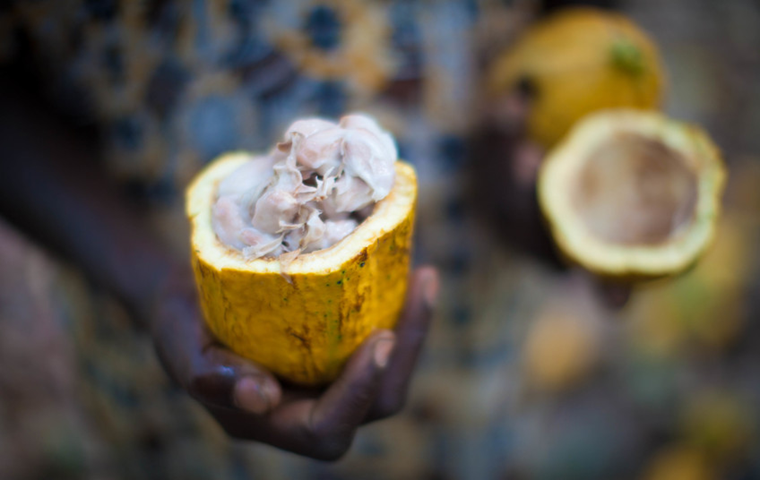As the new cocoa harvest season kicked off in Côte d’Ivoire earlier this month, it also marked the sad moment when KitKats are no longer Fairtrade, a few months after Nestlé announced that KitKats would no longer contain Fairtrade cocoa and sugar.
As the announcement was made, we shared our concerns that the new arrangement could leave farmers and their co-operatives worse off. A lack of transparency raised serious concerns about the potential impact on farmers, at a time when they are already facing huge challenges and uncertainty posed by the Covid-19 pandemic.
Millions working together for change
Over the summer, as you may have seen, the news seemed to strike a chord with the UK public’s deep-rooted sense of fairness and justice. We saw a strong response from the public, civil society and politicians unfold, raising their concerns and calling on Nestlé to reconsider their decision. Over 300,000 signed petitions, MPs spoke out in Parliament and numerous charities and NGOs stood up for the affected farmers.
This independent spirit of grassroots action has a long history in UK society, no doubt rooted in the often talked about British sense of fair play. From the early consumer campaigns to boycott slave-grown sugar in the 1790s, to huge movements calling for trade justice in the 2000s, there’s a rich history of regular people making their values known and taking action into their own hands to tackle the roots of unfairness in international trade.
Fairtrade itself was launched in the UK 26 years ago thanks to civil society organisations and their supporters sharing a vision of connecting producers and consumers that puts more humanity, dignity and respect into international trade structures marked by deep power imbalances and shocking levels of poverty.
That vision, and simple action of choosing Fairtrade products, captured the public imagination as thousands of independent community groups and millions of ethical consumers have rallied behind the Fairtrade vision establishing justice in trade as a public conversation. It remains at the core of Fairtrade’s position in UK society today, with nine out of ten UK consumers recognising the Fairtrade Mark, and over seven out of ten people choosing Fairtrade products when they shop. These everyday choices are critical in forcing a fairer deal for farmers and workers around the world on the agendas of governments and large companies.
What’s it all mean for farmers?
Back to the matter in hand, despite the groundswell of concern over the changes, raised independently by so many people in recent months, the decision for KitKat to leave Fairtrade didn’t change. It would appear though, that the strong public reaction and the many questions asked since the initial announcement in June has helped to bring about more transparency and commitments over the package that cocoa farmers will now receive in place of Fairtrade. We’ve written more details about what this all means for farmers and what more we now know compared to when the decision was first announced.
Read more about what Nestlé’s package means for farmers
Although the degree of further information and increased commitments shared are welcome, and are an improvement on what was initially announced, we remain concerned about the potential impact the change will have on thousands of farmers and their co-ops. Short-term mitigation funds will offer some extra protection for farmers but they won’t replace the full benefits of the Fairtrade Premium, with farmers having to adapt to a 50% drop in the amount of Premium under their control under the new arrangement. The outlook is even more uncertain after the next two years, when the short-term initiatives currently proposed, and Nestlé’s commitment to match the Fairtrade Minimum Price safety net, come to an end.
This is a hugely disappointing moment, first and foremost for the cocoa farmers who have expressed their desire to keep selling on Fairtrade terms, and the sugar farmers who have lost a valuable Fairtrade market for their produce. It’s also an important reminder of the benefits that Fairtrade delivers for producers, the financial security, and the greater power it puts in the hands of farmers to decide how to develop their co-ops and communities.
It’s clearer than ever – we need more power in the hands of farmers
Atse Ossey Francis, Chair of the Ivorian Fair Trade Network (RICE), represents hundreds of cocoa co-operatives and spoke out about the changes in an open letter back in July. He recently told us:
‘It means a lot to have seen so many people in the UK and elsewhere support us in these difficult times. In supporting Fairtrade, you’re choosing to put more power in the hands of producers like us. With the COVID-19 pandemic and climate change which are making the lives of producers more difficult, it’s more important than ever. Let’s use this moment to step up our efforts to make the cocoa industry fairer, which respects the producers and gives us the financial security that we need. Together we can make that a reality.’
The public reaction to the KitKat news in recent months shows just how important values of fairness and justice are to people of the UK, and it’s clear this authentic and passionate support for farmers wherever they may be is needed more than ever. So we may be disappointed, but we’re not disheartened in our quest to make trade work for those which it currently discriminates against – the farmers and workers across the globe we rely on for many of our favourite products.
By choosing Fairtrade, everyone can play a part in bringing about the world we all want to see. A world where farmers and workers in the global south have the power, rights and resources to shape their future.
To all the chocolate lovers, fans of fairness, and friends of farmers – choose Fairtrade and choose the world we all want!
